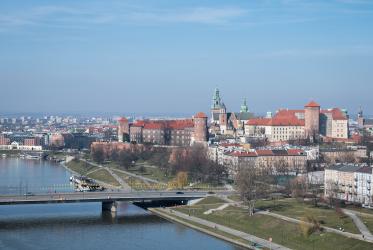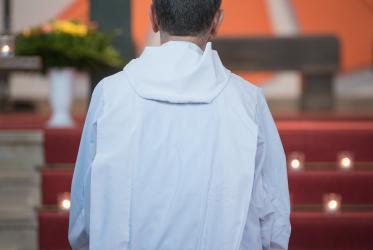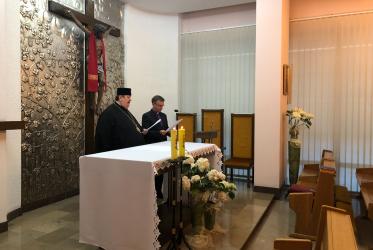Église évangélique de la confession d'Augsbourg en Pologne
(Kościół Ewangelicko-Augsburski w Polsce)
The Lutheran Reformation made early gains in the region. The point of entry was East Prussia where Germans and Poles lived in friendly co-existence. The Lutheran Church in East Prussia continued to use Polish until well into the 19th century. However, the Counter-Reformation was aggressive and erased most of Lutheranism. The complete partitioning of Poland by Russia, Austria and Prussia in 1795 opened a new phase of religious history. Large Lutheran congregations were formed in the cities. In Prussia's part of Poland, strong congregations developed in an enlarged Silesia. When, in 1918, the new Poland emerged as an independent republic, there were seven Evangelical church bodies, mostly Lutheran, with 500,000 members. During the second world war many pastors were arrested and sent off to concentration camps in Germany. After 1945 membership fell to about 80,000 through emigration to Germany. The ECACP is a minority church, but the largest Protestant church in the country. The highest authority of the church is the synod. The consistory is the highest executive authority. The diaspora character of the church has an impact on the financial situation, which is quite tense. The church is supported by the contributions of its members.
The main priorities of the church are diakonia, and evangelization and mission, with two independent units: Diakonia and the centre for mission and evangelism. Diakonia received its legal identity in 1999. It runs 27 diakonia stations, nine nursing homes, a centre for handicapped people, a centre for alcohol addicts, a family care home and nursery schools. It also coordinates the work of the dioceses and parish diakonias and seeks the funds for its development. Diakonia is responsible for the social policy of the church. Each year it conducts several actions, which have spread widely throughout the church: the European Voluntary Service, the "Shoebox" action in which children prepare gifts for children in Ukraine, the "Christmas Help for Children", a joint campaign with the Roman Catholic and Orthodox churches, and the "Diaconal savings box" through which money for children's needs is collected during the Lenten period.
The centre for mission and evangelism (CME) was established in 1997 and is responsible for coordination and development of mission work within and outside the Lutheran Church. The centre focuses on stimulating the spiritual life in the congregations, through evangelism meetings and the training of youth leaders, Sunday school teachers etc.; organizing conferences and Christian events; publishing and media activities (newspaper, radio programmes); supporting the establishment of new congregations, and introducing new methods, ways and means to share with others the Good News about Jesus Christ in the local communities. CME coordinates work in the following areas of ministry: children, youth, married couples, women, and the Bible hour. It has a music and a theatre group. It runs also the Bible school, organizes anti-alcohol actions in the schools, and evangelistic campaigns in Dziegielów and Mragowo. The campaign in Dziegielów is the biggest in Central and Eastern Europe for people of all ages and creeds and has been organized by the church since 1958.
Currently the big challenge is the enlargement and renovation of the church centre in Warsaw, where the consistory and Diakonia have their offices. The building is used for meetings and other activities, and for the theological academy where the pastors are trained. The academy has students from all non-Roman Catholic churches such as Protestants, Old-Catholics and Orthodox. The church has also its own printing and publishing house, Augustana.
The ECACP maintains contacts with other churches throughout Europe and beyond. It has bi-lateral relations with, among others, Evangelical churches in Germany, Sweden, Lithuania, Austria, USA, Slovakia, Czech Republic and Denmark.




